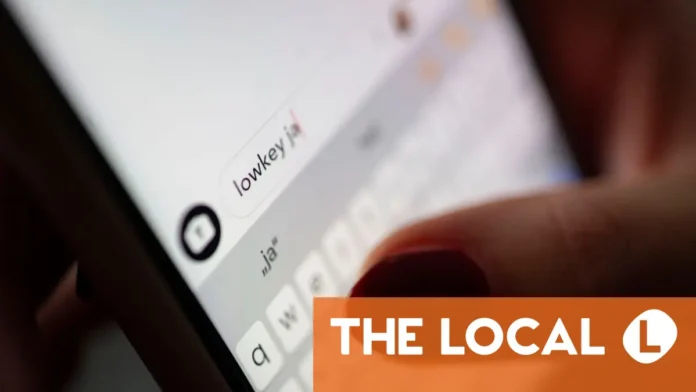The results of the latest German Youth Word of the Year poll are in. Here’s the most popular slang words the kids in Germany have been using.
If you’re raising children in Germany, you will have noticed that the language they use with their friends sounds like a completely different dialect.
Teens are constantly inventing and popularising new slang, and in Germany this often means blending German with English in unexpected ways.
Since 2008, Langenscheidt Publishing tries to keep up with the latest trends by organising an online vote each year exclusively for people between the ages of 11 and 20.
This year nearly two million votes were recorded since the end of May, making it one of the most popular youth language polls to date.
Here are the top 10 youth words in Germany for 2025 according to the poll.
1) Das crazy
A mix of German and English, this term is a real “all-purpose weapon of speechlessness”, according to Langenscheidt.
The expression is used when something is surprising, unbelievable, or when you just don’t know what else to say. It’s a humorous, all-purpose filler that breaks grammar rules on purpose: You got tickets to the concert? Das crazy!
Advertisement
2) Goonen
This verb, which was only narrowly beaten by Das crazy began as a way of saying that someone was watching porn for far too long, but has evolved into more of an all-purpose verb for masturbation.
The word is considered explicit and not appropriate in all contexts: Ich glaube es nicht. Er hat wieder goonen gesagt (I don’t believe it. He said “goonen” again).
3) Checkst du?
This phrase is usually tacked on to the end of a sentence and used to make sure the other person is listening.
It’s basically a new stand-in for Verstehst du? (Understand?), as older Germans would say.
Example: Das ist voll einfach, checkst du? (It’s super easy, you know?)
READ ALSO: Eight German words used in English – but with different meanings
4) Digga(h)
This terms, often used as part of a greeting, is synonymous with terms like bro, man, girl or dude. It also functions as an exclamation or reaction.
“Was geht, Digga?”
What’s up, bro?
Advertisement
5) Lowkey
This one is taken explicitly from English slang, and is used as a qualifier to express that something, while still worth mentioning, is not a huge deal.
Ich bin lowkey nervös wegen der Prüfung.
I’m a bit nervous about the test.
6) Rede
Used when someone says exactly what everyone else is feeling and thinking.
Rede! Endlich sagt’s mal jemand!
Well said. Finally, someone has said it.
7) Schere
A term that comes from the gaming scene, where players who’ve messed up sometimes hit the scissors icon.
Sorry, das war Schere von mir.
Sorry, my mistake.
Advertisement
8) Sybau
An acronym that stands for ‘Shut your bitch ass up’ which is often written in videos and online comment sections.
It’s often used ironically or even affectionately, in the way that older generations might have said “Shut up” to express surprise.
Sybau, ich hab das schon gehört.
Shut up, I‘ve already heard that.
READ ALSO: The secrets of small talk in Germany you need to know
9) Tot
A term that describes something or a situation that is completely off the mark, or otherwise lame, embarrassing, or unintentionally uncool.
Die Party war tot.
The party was dead.
10)Tuff
Whether you’re talking about the way someone looks, something they’ve done, or an awesome product, tuff always fits when something is genuinely impressive
Das neue Spiel ist echt tuff.
The new game is really awesome.
Should parents attempt to use youth slang?
Experts broadly agree that parents should try and understand the words and phrases their children use in order to stay connected and aware of what’s happening in their lives.
READ ALSO: The words you need to understand Germany’s childcare benefits
But however tempting it may be for parents to try and adopt a few of these slang terms themselves, attempting to do so is usually cringe.
Age old rules maintain that new words are ‘cool’ for exactly as long as it takes parents to start using them. When parents try on new slang terms they often end up destroying the quality their children value most about them.
So parents are advised to ask about words they don’t know to understand them, but also to generally stick to their own vocabulary.
Disclaimer : This story is auto aggregated by a computer programme and has not been created or edited by DOWNTHENEWS. Publisher: thelocal.de







